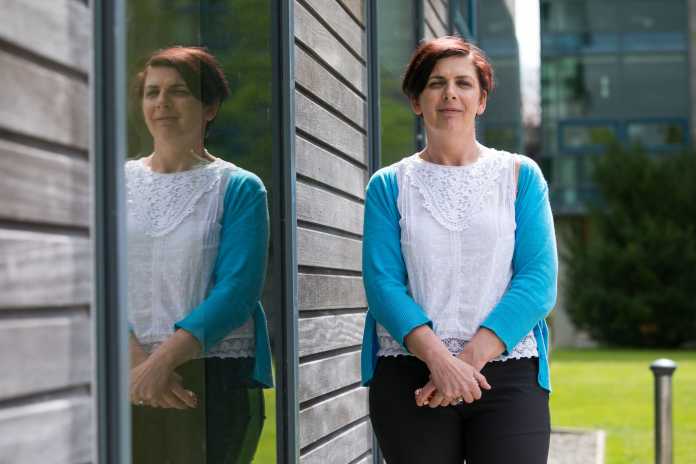

Pictured was Cork mother Una Butler.
Photo: Oisin McHugh True Media
ACCURATE and sensitive reporting of stories involving issues of mental health, suicides and murder suicides, has been called for by a mother who lost her two young daughters and husband in a murder suicide.
Una Butler lost her two daughters Zoe (6) and Ella (2) and her husband John (43) in a murder suicide in 2010.
Speaking at a symposium on media coverage of mental health stories, organised by the Journalism Department at the University of Limerick, Ms Butler called for accurate and sensitive reporting in cases.
“I can understand that people just cannot comprehend or don’t want to read about it and that it why it is so important that when murder suicide cases are being reported on that it should be reported accurately and in a sensitive manner- no sensationalising, no glamorising of the events,” Ms Butler said.
“The media have and are in a powerful position on how they report anything in general, but in particular with murder suicide accurate reporting is essential. People and society have a right to know how often these cases are happening,” she added.
Ms Butler who has advocated for reform of the Mental Health Act since the tragic deaths of her family, believes her children would still be alive had she been involved in her husband’s treatment.
“I engaged with the media following the murder suicide of my husband John and daughters, Ella and Zoe in 2010. After their deaths I received a two page report from the HSE which was inadequate and an insult. I called for a detailed investigation into his treatment from the HSE and also wanted the Mental Health Act 2001 to be amended to include spouses or partners in the treatment of the family member suffering with their mental health to help prevent further cases from happening and also especially for the welfare of children,” she said.
“The bottom line is that which ever way you look at the previous cases of murder suicide in Ireland the past 20 years or so, the mental health of the perpetrator is a major factor”.
“I do think that because I spoke out in the media an investigation did happen. I also think that it raised awareness of how often murder suicide is happening in Ireland.
Ultimately, I went public and used the media because I thought and still believe that my family tragedy could have been prevented, had I been involved in my husband’s treatment, my children should be alive! that is the bottom line.”
The symposium heard addresses from Professor Jane Singer of City University London as well as Professor Ella Arensman, from the National Suicide Research Foundation Claire Sheeran, from Headline, the national media monitoring programme for mental health and suicide and Sean Donlon, The Chairman of the Press Council.
A panel debate followed with journalists and news editors from The Irish Times, RTE, The Irish Daily Star, Live 95FM and The Limerick Post newspaper,
Journalism lecturer Audrey Galvin, whose PhD study focuses on the ethical framing of murder suicide stories said:
“Our primary focus at this event was to look at when mental health discussion in the media is part of news events which affect the wider populace, for example murder suicides.”
“Part of that examination involves asking if the way in which journalists use sources, imagery and language, for example, perpetuate stereotypes, fear and misinformation? What ethical framework or guidelines can journalists who are under time and resources pressures use, when approaching such stories?”
“Conversely, there is without doubt a public interest in the area of mental health and in particular murder suicides, is it time, we now consider these phenomena as a societal problem, rather than individual. Here, the media have a large role to play. ”


